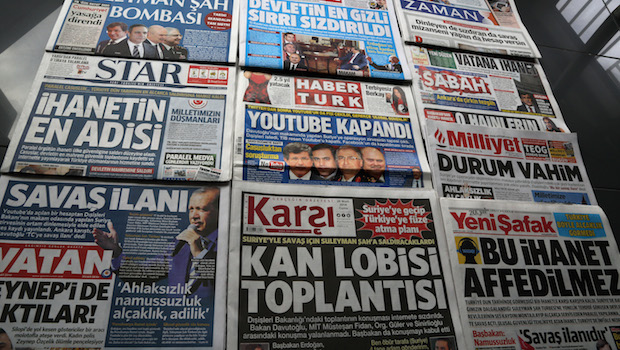A friend of mine sent me an email about last month’s Palestine International Media Forum, held in Turkey last month, that truly shocked me. He said that “the media and press were put on trial and censured” at that forum. Indeed, the full thrust of his statement did not hit me until after I had responded to his email and closed my laptop.
Like many of those who have worked as a news editor, I often mull the stories I edited years ago, exactly like when you mentally recall a film they watched or radio show they listened to years before. After contemplating my friend’s words, I found myself beset by feelings of pain and surprise, wondering whose job is it to try whom. Is it the task of media forums to turn into a court of law, dishing out proclamations and sentences? If so, who gives them the power to condemn journalists in this manner?
These questions lingered in my mind until I googled the “judges” at this forum and their declarations. In fact, I was relieved by what I uncovered, as it emerged that my friend had been overstating things a little bit in his e-mail. I doubt that the organizers had the intention of putting anyone on trial, and the statement issued at the conclusion of the forum confirmed my doubts. As to whether the participants’ remarks were judgmental, well, they are responsible for what they said, not the conference organizers.
This brings me to the tragedy of the double standards in the position of Arab and Palestinian journalists, as well as the contradictory way some Muslim countries, including Turkey, deal with the Palestinian cause and the tragedy of its people, which began even before the 1948 Palestinian exodus. Palestinian tragedies have multiplied and will continue thanks to leaders who, while claiming to be pro-Palestine, use taxpayers’ money to feed the Israeli economy. Without doubt, most of these taxpayers have genuine sympathies for Palestine and its people, who have been patient in the face of the injustice of the Israeli occupation. This is not to mention political leaders from all sides of the spectrum who rejoice in promoting empty pro-Palestine slogans, while at the same time turning a blind eye to the suffering of the Palestinian families in refugee camps.
What sort of double standard is this? How long will it last? After all, it has been going on for decades. In the early 1980s, I was dispatched to cover a session of the Palestinian National Council, which was meeting in Algiers at the time. When I arrived at the hotel in the evening, I told the receptionist that the hot water was not working. The man looked at me with steely eyes and asked if I was Palestinian, which of course I answered in the affirmative. “What are you [Palestinians] doing here? Isn’t your council session supposed to be held in the refugee camp?” he barked at me. This anecdote illustrates the core of the suffering of the Palestinians, as well as all Arabs and Muslims.
The various Palestinian leaderships have a vast number of important responsibilities. How respectful of their responsibilities have they been since 1967? In my opinion, very few have been sufficiently dedicated to their task. More frequently, their behavior has demonstrated a shocking contrast between their words and actions. The same applies to the behavior of political leaders across the Arab and Muslim worlds, who may talk the talk but unfortunately do not walk the walk.
Wouldn’t any reasonable person by surprised to read that the deputy chairman of Turkey’s Justice and Development Party Deputy, Yasin Atkay, described Israel as a rogue state imagined into existence by the UN, whose presence “contravenes universal values”? Well, that’s what he said at the opening of the Palestine International Media Forum last month. In this case, how are we to understand Ankara’s hurried recognition of the state of Israel, less than a year after its establishment in March 1949?
Who can explain the ongoing relations between Ankara and Tel Aviv, in spite of Israel’s attack on the Turkish peace flotilla to Gaza, which resulted in the death of nine Turkish citizens? The explanation is quite simple, actually: the joint military and economic interests between Turkey and Israel. The sheer scale of Ankara’s ties with Tel Aviv contradicts its claims that it is the international state that is most concerned with the Palestinian cause.
As for the farcical Erdoğan–Peres clash at Davos in 2009, which ended when the Turkish prime minister famously walked out: All was forgotten once everyone remembered the common interests that bind the two countries.
So, while it is good for a Palestinian media forum to be held in Istanbul, it would have been even better if it were held in a Palestinian refugee camp with Turkish sponsorship. The best thing, of course, would be for people not to elevate themselves and judge all those with different opinions.
